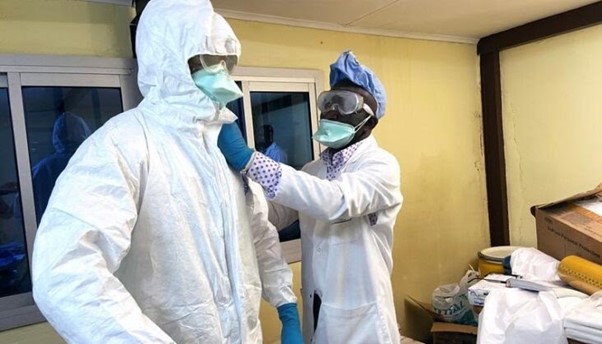COVID-19 Uncovers Decades Of Inequalities, Amplifies Neglect – Amnesty International
Marginalised groups, such as women and children have suffered years of neglect and destructive policies which were amplified by the pandemic. Amnesty International looks at the trend in its latest report.

The COVID-19 pandemic has exposed the terrible legacy of deliberately divisive and destructive policies that have perpetuated inequality, discrimination and oppression and paved the way for the devastation wrought by COVID-19, Amnesty International (AI) said in its annual report, on Wednesday.
The report, ‘Amnesty International Report 2020/21: The State of the World’s Human Rights’ covers 149 countries and delivers a comprehensive analysis of human rights trends globally in 2020.
In it, the organisation describes those already most marginalized, including women and refugees, as bearing the brunt of the pandemic, due to decades of discriminatory policy decisions by world leaders.
Health workers, migrant workers, and those in the informal sector —many at the frontlines of the pandemic— have also been betrayed by neglected health systems and patchy economic and social support, according to AI.
The response to the global pandemic has been further undermined by leaders who have ruthlessly exploited the crisis and weaponized COVID-19 to launch fresh attacks on human rights, the organisation says.
“COVID-19 has brutally exposed and deepened inequality both within and between countries, and highlighted the staggering disregard our leaders have for our shared humanity. Decades of divisive policies, misguided austerity measures, and choices by leaders not to invest in crumbling public infrastructure, have left too many easy prey to this virus,” said Agnès Callamard, AI’s new Secretary General.
“We face a world in disarray. At this point in the pandemic, even the most deluded leaders would struggle to deny that our social, economic and political systems are broken,” she added.
The report shows how existing inequalities as a result of decades of toxic leadership have left ethnic minorities, refugees, older persons, and women disproportionately affected by the pandemic.
COVID-19 worsened the already precarious situation of refugees, asylum seekers, and migrants in many countries, trapping some in squalid camps, cutting off vital supplies, or precipitating border controls that left many stranded.
The report spotlights Uganda, the largest refugee-hosting country in Africa with 1.4 million refugees, who immediately closed its borders at the start of the pandemic and did not make an exception for refugees and asylum seekers trying to enter the country. As a result, over 10,000 people were stranded along its border with the Democratic Republic of Congo (DRC).
The report highlights a marked increase in gender-based and domestic violence, with many women facing increased barriers to protection and support due to restrictions on freedom of movement; lack of confidential mechanisms for victims to report violence while isolated with their abusers, and reduced capacity or suspension of services.
Those on the frontlines of the pandemic -health workers, and those in the informal sector– also suffered as a result of wilfully neglected health systems and pitiful social protection measures.
In Bangladesh, many working in the informal sector have been left without an income or social protections due to lockdowns and curfews. In Nicaragua, over the course of two weeks in early June, at least 16 health workers were dismissed after expressing concerns about lack of Personal Protective Equipment (PPE) and the state response to the pandemic.
“We are reaping the results of years of calculated neglect at the hands of our leaders. In 2020, under the unique strain of a pandemic, health systems have been put to the ultimate test and people have been left in financial freefall.
“The heroes of 2020 were the health workers on the frontlines saving lives and those bunched together at the very bottom of the income scale, who worked to feed families, and keep our essential services going. Cruelly, those who gave the most, were protected the least,” Callamard said.
Support Our Journalism
There are millions of ordinary people affected by conflict in Africa whose stories are missing in the mainstream media. HumAngle is determined to tell those challenging and under-reported stories, hoping that the people impacted by these conflicts will find the safety and security they deserve.
To ensure that we continue to provide public service coverage, we have a small favour to ask you. We want you to be part of our journalistic endeavour by contributing a token to us.
Your donation will further promote a robust, free, and independent media.
Donate HereStay Closer To The Stories That Matter




